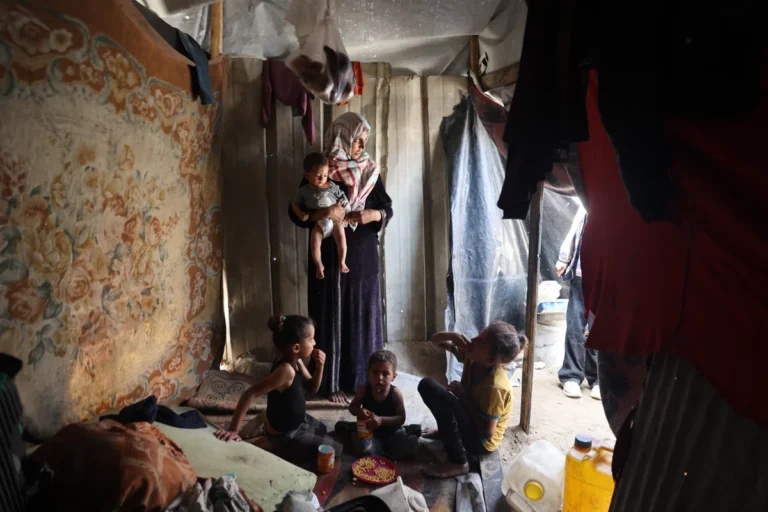Statement by Principals of the Inter-Agency Standing Committee – Stop the Assault on Palestinians in Gaza and Those Trying to Help Them
On November 1, 2024, the Inter-Agency Standing Committee (IASC), comprising leaders from 15 United Nations and humanitarian organizations, issued a powerful statement urging an immediate end to the violence in Gaza. This call to action highlights the dire humanitarian crisis unfolding in the region, where civilians and humanitarian workers are facing unprecedented dangers.
Background
The ongoing conflict in Gaza has escalated dramatically over recent weeks, resulting in catastrophic humanitarian conditions. As hostilities continue, the situation for civilians—especially women and children—has become increasingly perilous. The IASC’s statement serves as a crucial reminder of the urgent need for protection and support for those affected by this crisis.
Key Messages from the IASC Statement
Urgent Call for Protection of Civilians:
The IASC leaders emphasize that all parties involved in the conflict must prioritize the protection of civilians. They specifically call on the State of Israel to cease its military assaults on Gaza, which have led to immense suffering among innocent populations.
Apocalyptic Situation in North Gaza:
The statement describes the situation in North Gaza as “apocalyptic.” The area has been under siege for nearly a month, with basic aid and life-saving supplies being systematically denied. Recent reports indicate that hundreds of Palestinians have been killed, primarily women and children, while thousands have been forcibly displaced from their homes.
Impact on Healthcare and Humanitarian Workers:
Hospitals in Gaza are facing severe shortages of supplies and have come under direct attack, resulting in tragic loss of life among patients and medical staff. Health workers are increasingly at risk, with reports of them being detained while trying to provide essential services. The ongoing violence has disrupted critical medical care, leaving many without access to necessary treatments.
Destruction of Infrastructure:
The conflict has led to widespread destruction of infrastructure. Schools that serve as shelters for displaced families have been bombed or forcibly evacuated. Agricultural systems have also been devastated; livestock are dying, crops are destroyed, and vital agrifood infrastructure has been decimated. This destruction exacerbates food insecurity and threatens the livelihoods of countless families.
Targeting Vulnerable Populations:
The needs of women and girls in particular are overwhelming and continue to grow daily. Many essential services related to sexual and reproductive health have been disrupted, leaving vulnerable populations without support. Reports indicate that civilians seeking safety are being targeted, with men and boys facing arbitrary arrests and detentions.
Access Constraints for Humanitarian Aid:
Humanitarian aid efforts are severely hampered by access constraints. Basic life-saving goods are not reaching those in need due to ongoing hostilities and blockades by Israeli forces. In addition, delays in vaccination campaigns—such as those for polio—pose significant risks to children’s health in the region.
Legislative Actions Affecting Humanitarian Response:
Recently adopted legislation by the Israeli Parliament seeks to ban UNRWA (United Nations Relief and Works Agency) from operating in Gaza, threatening vital humanitarian assistance. If implemented, such measures would violate international law and further endanger millions of Palestinians who rely on UNRWA for support.
Call to Action
The IASC’s statement makes clear that immediate action is required:
- There must be an immediate cessation of hostilities and a sustained, unconditional ceasefire.
- All parties must ensure unimpeded access for humanitarian relief efforts.
- Compliance with international humanitarian law is essential; attacks against civilians and civilian infrastructure must stop.
Conclusion
The situation in Gaza is dire, with countless lives hanging in the balance. The global community must unite to advocate for peace, protect human rights, and uphold humanitarian principles. It is imperative that we amplify our voices against this tragedy and push for immediate action to alleviate the suffering of those caught in this conflict.
Signatories
The statement is supported by prominent leaders from various UN agencies and humanitarian organizations:
- Ms. Joyce Msuya (OCHA)
- Ms. Nimo Hassan (ICVA)
- Mr. Jamie Munn (ICVA)
- Ms. Amy E. Pope (IOM)
- Mr. Volker Türk (OHCHR)
- Ms. Abby Maxman (Oxfam)
- And many others committed to addressing this urgent crisis.
Together, we can work towards a future where humanitarian principles are respected, and all individuals can live free from violence and fear.
References
- Inter-Agency Standing Committee (2024). Statement by Principals of the Inter-Agency Standing Committee – Stop the assault on Palestinians in Gaza and on those trying to help them Link.
- UNHCR (2023). Statement by Principals of the Inter-Agency Standing Committee on the situation in Israel and the Occupied Palestinian Territory Link.
- ICVA (2024). Statement by Principals of the Inter-Agency Standing Committee – Civilians in Gaza in extreme peril while the world watches on: Ten requirements to avoid an even worse catastrophe Link.
- Inter-Agency Standing Committee (2024). Statement on the situation in the Occupied Palestinian Territory Link.


